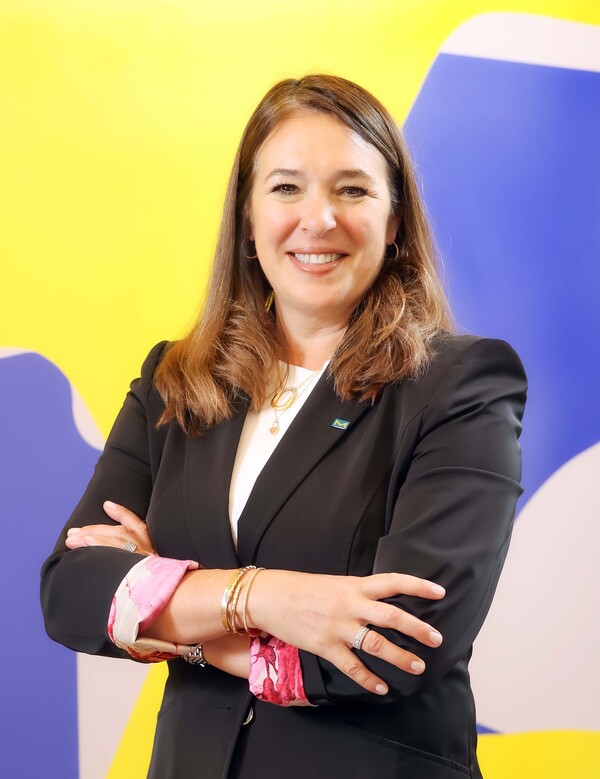When Karen Madden envisions the future of Korea’s industrial landscape, she sees a strong synergy with Merck's ambitions. “When you look at Korea’s strategic priorities and the areas Merck is focusing on, there’s an almost perfect alignment," she said.
As the chief technology officer for Merck KGaA’s Life Science division, Madden had just returned from a presentation at Invest KOREA—a platform designed to attract foreign investment. There, she had outlined Merck’s strategic growth areas and highlighted just how closely they align with Korea’s own ambitions. Two sectors, in particular, stood out: semiconductors and life sciences, both of which are at the heart of Korea’s industrial future.
"We’ve really been accelerating our footprint and investments here over the last decade," Madden told Korea Biomedical Review in an interview last Wednesday, following her presentation in Seoul.

At the core of Merck’s mission in Korea is biomanufacturing—a sector poised for transformation, according to Madden. "Korea is setting its sights on becoming the world’s top bio manufacturer by 2025," she said, referencing her observations at Invest KOREA.
Madden describes this as an area of "huge strategic importance" for both Merck and Korea, one that demands all the resources, science, and vision Merck can provide. The company is pouring millions into the infrastructure needed to bring Korea’s vision to life.
Merck's presence in Korea, a relationship that stretches over three decades, has evolved into a powerhouse of innovation that now includes 13 sites and more than 1,700 employees. In May, Merck began construction on a new bioprocessing facility in Daejeon, with a €300 million ($322 million) investment. The facility, set to be completed by 2026, will support clinical-stage development and manufacturing for the Asia-Pacific biotech and pharmaceutical industries.
Daejeon, to Madden, feels like a smaller Boston, her hometown. “It has those same ingredients for innovation—academic institutions and government support. It’s a science ecosystem thriving on diversity, where innovation can thrive." She paused, reflecting on the city’s potential. "But our work with KAIST—there’s nothing quite like it, even in Boston.”
The partnership with the Korea Advanced Institute of Science and Technology (KAIST), established in May through an MOU, involves providing Merck’s products to KAIST researchers, offering global innovation program opportunities, and setting up an Experience Lab for new research approaches. Merck will also support scholarships for KAIST students and collaborate on joint R&D projects.
This partnership, Madden said, is a template for the future. By aligning Merck’s investments in Daejeon with the research and development happening at KAIST, the company is not only contributing to Korea’s biotech landscape but also helping shape the lab and facility of the future. “When our investments in Daejeon converged with KAIST’s expertise, it felt like everything aligned at the perfect moment,” she said.
Madden said KAIST aligns perfectly with Merck’s "strategic innovation vectors," areas where the company believes it can “play and win” by driving forward market-leading solutions to the most pressing scientific challenges. Together, they are delving into next-gen technologies like cell and gene therapies, mRNA advancements, antibody-drug conjugates, and revolutionary new biology.
The future is already in motion. Merck is exploring the intersection of biology with AI and digital technology—a goal where biology could one day be programmed just like software. “The programs we’ve developed with KAIST reflect these forward-looking goals,” Madden said.
Merck has also launched the Merck-KAIST International Graduate Fellowship Program, which will select two researchers to receive €30,000 annually for three years. Merck aims to provide opportunities for selected students and faculty to spend time at Merck's research labs worldwide.
Alongside academic collaboration, Merck is injecting momentum into startups at KAIST. With mentorship and strategic guidance, the company is looking to lay the groundwork for future partnerships—potentially including joint R&D and collaborative projects.
“We see this partnership as a model for future collaborations,” Madden said. "Our goal is to take what we’re doing with KAIST and replicate them not only in the U.S.—possibly in Boston—but also in other regions around the globe,” Madden said. “KAIST was a natural fit for us. It’s exactly the kind of partnership we hope to establish across the globe."
Madden added that Merck’s presence in Korea positions the company to stay intimately connected with its customers, not just within the country but also with the leading manufacturing giants of China and Japan. This proximity, Madden pointed out, is strategically critical. "Korea’s stability, both economically and geographically, encourages companies like ours to make long-term investments," she said.
Related articles
- Merck Biopharma Korea wins health ministry award for family-friendly initiatives
- Merck presents RWE study of multiple sclerosis drug Mavenclad in Koreans
- Merck Biopharma's Bavencio changes urothelial carcinoma treatment paradigm in Korea
- Prestige BioPharma opens Korea’s largest innovative drug R&D center in Busan
- Merck Korea and LG Chem to co-promote type-2 diabetes drugs in Korea
- Researchers develop original technology to treat cancer by reverting it to normal cells
- ‘Merck, the oldest pharma company, leads innovation, standard of care’
- Merck's Daejeon facility investment to boost supply chain resilience, innovation in APAC

